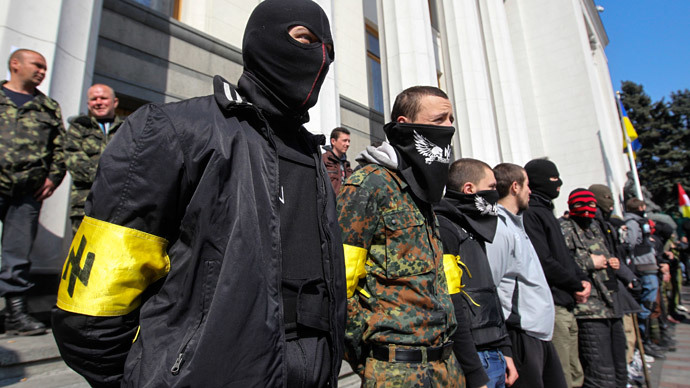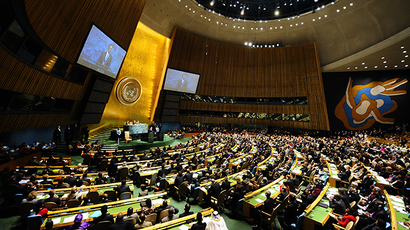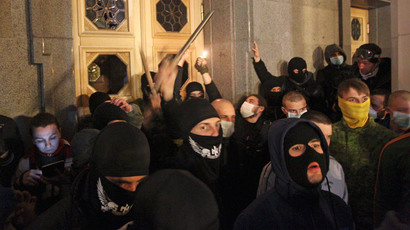Putin, Obama discuss political chaos in Ukraine

Russian president held a phone conversation with Barack Obama to discuss possible scenarios of stabilizing the chaotic social and political situation in Ukraine. Putin once again highlighted the ongoing extremism rampant in Kiev as well as other regions.
The leaders spoke for about an hour on Friday, discussing the situation in Ukraine. Vladimir Putin drew Obama’s attention to the continuing acts of intimidation against civilians as well as government and law enforcement agencies conducted by extremists in Ukraine, the Kremlin said in a statement.
In this context, the Russian leader proposed to President Obama to consider possible steps that the international community can take to help stabilize the situation.
Meanwhile, in a statement from the White House, Washington said that a phone call was a follow up of a proposal presented by Secretary of State John Kerry to Russian Foreign Minister Sergey Lavrov, at the Hague earlier this week. No details on the proposal was given, but it also allegedly involves diplomatic solution to Ukraine.
Both leaders agreed that the specific parameters of such a cooperation will be discussed by the foreign ministers of Russia and the United States.

In the meantime, the UN Security Council held another closed meeting on Ukraine on Friday. After the discussions, ambassador Vitaly Churkin spoke to the press, once again outlining Russia’s position in this crisis.
“Someone must seriously think through what they are doing and the consequences of certain actions they are advocating,” Churkin said. “Our international partners insist that the only way out is to have this presidential election on May 25. In a situation of political chaos in the country? What will be the effect of those elections if some of the regions do not participate or turnout is very low in the course of those elections?”
Russia keeps insisting that Ukraine needs a constitutional reform before any elections could take place that would be both legitimate and relieve the chaotic situation in the country.
“There is no political leader in sight who might be able to unite the country. All the politicians one can hear about are extremely divisive for the Ukrainian society,” Churkin explained. “The other thing that is going to come up in the next couple of months is most likely dramatic decline of the living standards of people, because of IMF package which now has been proposed to them.”

Churkin said that Western partners as well as Ukrainian representatives keep urging Russia to engage in a dialogue – at the same time turning a deaf ear to what Russia is saying.
“If you want dialogue, please respond to what we’ve been saying. They are responding, sometimes, but the response is that: ‘Well, but you know, the Ukrainians.. We understand the importance of constitution, but how can they do it now? Can they do this constitutional assembly? There is no one to organize the constitutional assembly!”
“Well, if there is nobody to organize, maybe this is exactly the role of the international community? This Compact support group we have been proposing to help them organize those things if there is nobody currently in Ukraine who can take this responsibility,” Churkin said.
“Our position is very clear,” Churkin said, adding it is “disappointing that those things which are obvious to us do not seem to sink in in the minds of our international interlocutors and our Ukrainian colleagues.”
The current constitution in Ukraine does not provide for sufficient rights of the regions, Churkin explained. Regardless of whether you consider the 2010 document or the law of 2004 to which Ukraine reverted a day before the coup deposed the government.
“In Ukraine, every time a new president comes in, they change a constitution. They change the constitution to suit a particular politician, a particular set-up play between various political forces at a given moment,” Churkin explained.
Local governors appointed by Kiev can hardly be considered public representatives, Churkin said, pointing out that those same corrupt oligarchs whom the people were standing against on Maidan now rule in the Eastern Ukraine.
“This is what they do in Ukraine, they send people from Kiev, sometimes with very bad reputation. You know, notorious corrupt oligarchs have recently been sent from Kiev to eastern part of Ukraine. And of course people don’t like it. They want to be able themselves to elect their governors, they want to be assured that somebody in Kiev will not switch off their Russian language TV receivers, that they will be able to speak their mother tongue. So, all those things we believe need to be reflected in a new constitution which could become the result of the constitutional reform and the referendum.”















